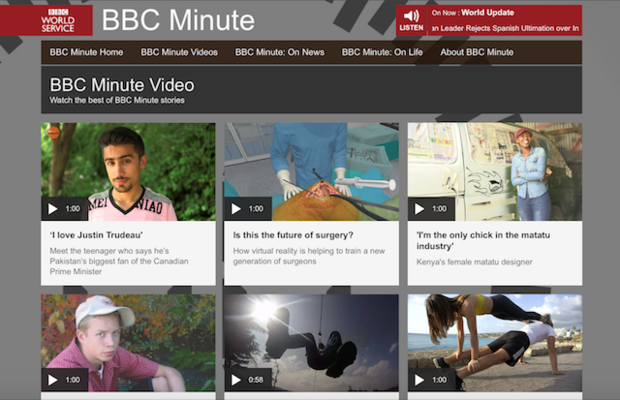BBC Minute, the 60 second radio bulletin from the BBC World Service, has launched video versions of its news bulletin in a bid to better engage with younger people around the world.
The London-based team work around the clock to produce half-hourly news bulletins for 25 partner stations across the Middle East and Africa, which then broadcast the shows to young people who want to know more about what's going on in other countries.
Chris Gibson, assistant editor, BBC Minute, explained that the videos have been introduced for partners to share on their own websites and social media channels.
"Radio stations are not just interested in audio anymore, they are visual beasts who want to use video to connect with their audiences – we are moving with them and giving them what they want," he said.
"It enables the BBC to reach wider audiences, to be on their phones as well as their radio stations. These young people in, for example, Lebanon or Egypt, are not going to the BBC channels to get our service, they're getting it from the social accounts of the local radio station they love and have a connection with."
BBC Minute has one video journalist based in London and another based at their French language sister service, BBC Afrique in Senegal, Africa, which they hope will result in a lot of new, original content being produced.
Story ideas come from the main talking points in the news, as well as what audiences are interested in – which can often be seen from reading the comments left on the BBC Minute videos.
The videos, just like the audio bulletins, are a minute in length, and focus on a single issue, ranging from Uganda's female body builders to street gymnastics in Lebanon.
Only three weeks into the process, some of the videos have surpassed over 1 million views on the social pages of partner stations.
"We are trying to make our videos reflect the world – audiences want a global perspective, not just what is going on in their own country," he said.
"We've found that young people in these countries have more interest in other young people in other countries than they do in older people in their own countries.
"It's not true that young people aren't interested in news, you just have to give it to them in the format that fits in with their lives and how they consume media."
Two videos are currently being produced each week, sent to all 25 partner stations, alongside the team's half-hourly radio bulletin and its twice-daily feature 'BBC Minute On…', which focuses on a single subject or key news story in more detail.
"If the main news bulletins are the what and when, 'BBC Minute On...' is the how and why – it's a minute on one subject, a deeper look."
The expansion of BBC Minute is part of the World Service 2020 project which has been supported by UK Government investment in the BBC World Service.
BBC Minute can be accessed via iTunes, Spotify, Tunein or via the BBC World Service’s own website.
Free daily newsletter
If you like our news and feature articles, you can sign up to receive our free daily (Mon-Fri) email newsletter (mobile friendly).










